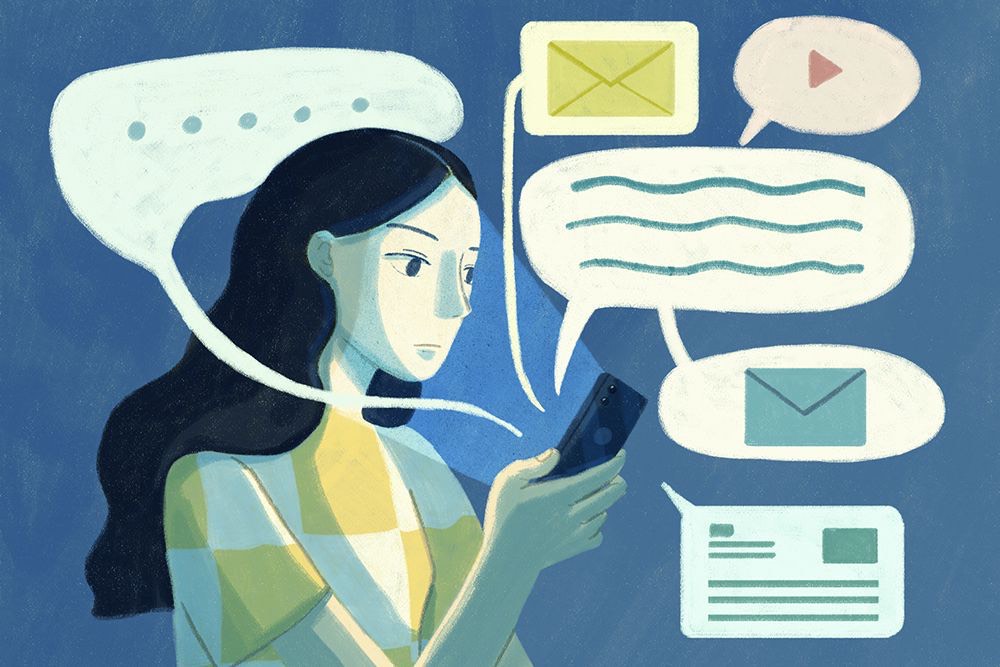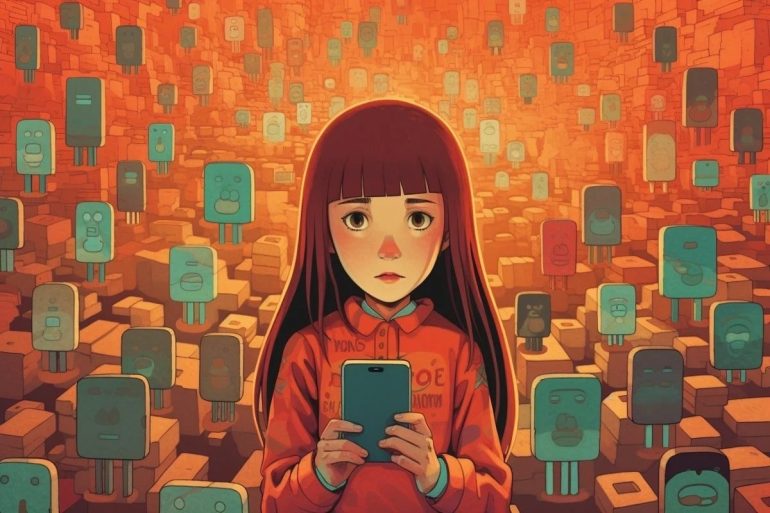By Jasleen Dhaliwal and Riya Badesha,
Over the past decade, social media has become an important part of modern life, particularly for teenagers. Platforms like Instagram, TikTok, and Snapchat allow us to communicate and express ourselves. However, research shows that social media use among teenagers can have positive and negative effects on their mental health, which is a rising concern.
On the positive side, social media allows teens to create online identities, connect with others, and build supportive networks based on shared interests or experiences. Online friendships can be especially beneficial for marginalized youth, such as racial, ethnic, and sexual minorities. Many teens feel accepted, supported, and able to express creativity through social media. These platforms can be a lifeline for teens lacking in-person support or experiencing stress, enabling them to seek help and join discussions on mental health.
Despite the good, social media can hurt teen mental health. The issue of kids being chronically online, especially after the COVID-19 pandemic, highlights cyberbullying as a major concern. Unlike regular bullying, cyberbullying can happen anytime, anywhere, and often where many people can see it. This can cause serious emotional pain. Teens who get bullied online often feel anxious, depressed, and even have thoughts of harming themselves.
Despite the good, social media can hurt teen mental health. The issue of kids being chronically online, especially after the COVID-19 pandemic, highlights cyberbullying as a major concern. Unlike regular bullying, cyberbullying can happen anytime, anywhere, and often where many people can see it.
Media platforms often fail to adequately address online harassment and cyberbullying. It is important to understand that not all of these problems are caused by social media users but also by the platforms we must hold accountable for their inactions.
Another issue is how social media affects self-esteem and body image. People often post perfect, edited photos on social media that show only the best parts of their lives. This can make teenagers feel like they aren’t good enough and need to change. Seeing these idealized images constantly can lead to body dissatisfaction and an endless chase for perfection.
Social media can also create a fear of missing out (FOMO). Teens may feel left out or lonely when friends post about fun activities without them. The pressure to always be online, get likes, and gain followers can be overwhelming and add to their stress.

Online use can also distract teens from important activities like homework and exercise, disrupt sleep patterns, and expose them to fake or biased information. It can distort their perceptions of others’ lives, expose teens to online predators and cyberbullying, and increase risks of anxiety and depression. Content promoting risky behaviors and negative interactions can lead to poor decision-making. However, it is important to note that these risks depend on the time spent on social media and the types of content viewed.
Exposure to harmful content on social media also has significant risks. This content, which is so easily accessible through simple clicks, has been linked to cases of suicide and self-harm among young users. Social media also worsens body dissatisfaction, disordered eating, and low self-esteem, particularly in girls.
Social media affects the brain’s reward and punishment systems, which impacts kids and teens whose brains are still developing. This can lead to addictive behaviors. The immature prefrontal cortex in youth affects their ability to control screen time and emotional responses, contributing to excessive use and short attention spans.
Exposure to harmful content on social media also has significant risks. This content, which is so easily accessible through simple clicks, has been linked to cases of suicide and self-harm among young users. Social media also worsens body dissatisfaction, disordered eating, and low self-esteem, particularly in girls.
Parents can set clear rules and limits on usage to help teens use social media responsibly and minimize negative effects, like no social media until homework is done or setting daily time limits. Parents and caregivers can reduce the potential harms of social media by setting clear expectations and boundaries for usage at home. Encourage open discussions about balancing online activities, setting content limits, and protecting personal information. Designate times and places, like mealtimes and before bedtime, where devices are off-limits to promote family bonding and reduce distractions. Leading by example and teaching children about the benefits and risks of social media, discussing privacy settings, and safe online practices are essential for fostering responsible use.
In conclusion, while social media offers significant benefits, it also poses considerable risks to teen mental health. By raising awareness, promoting healthy use, and supporting each other, we can help teenagers navigate the digital world more safely and positively.
Information provided on behalf of SACH South Asian Community Hub and Moving Forward Family Services.
http://www.sachbc.ca
https://movingforward.help/
Image source: Neuroscience News, Verywell / Catherine Song
Kathy Katella. How Social Media Affects Your Teen’s Mental Health: A Parent’s Guide. Yale Medicine, 17 June 2024, www.yalemedicine.org/news/social-media-teen-mental-health-a-parents-guide#:~:text=Some%20researchers%20think%20that%20exposure,feelings%20of%20exclusion%20in%20adolescents.
Murthy, Vivek. Social Media and Youth Mental Health The U.S. Surgeon General’s Advisory. National Institutes of Health, 2023, www.hhs.gov/sites/default/files/sg-youth-mental-health-social-media-advisory.pdf.
Tween and teen health. Mayo Clinic, 18 Jan. 2024, www.mayoclinic.org/healthy-lifestyle/tween-and-teen-health/in-depth/teens-and-social-media-use/art-20474437.



